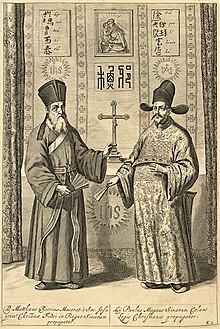Inculturation
In Christianity, inculturation is the adaptation of Christian teachings and practices to cultures. This is a term that is generally used by Catholics and the Orthodox, whereas Protestants (such as Anglicans and Lutherans), especially associated with the World Council of Churches, prefer to use the term "contextual theology".[1][2]
Background
The coexistence of Christianity and other cultures dates back to the apostolic age. Before his
Cultural conflicts continued until Christianity incorporated the
Inculturation after the discoveries
After the discoveries of new territories and the
China

The
Ricci had adapted the Catholic faith to Chinese thinking, permitting, among other things, the cultic veneration of ancestors, which he described as cultural practice. The Holy See disagreed, deeming the veneration an act of worship and hence idolatry. It forbade any adaptation of Christianity in the so-called Chinese Rites controversy in 1692 and 1742. The Chinese emperor felt duped and refused to permit any alteration of existing Christian practices. The Church suffered setbacks in 1721 when the Kangxi Emperor outlawed Christian missions.[10] According to Franzen, "The Vatican policy was the death of the missions in China."[11]
Papal teachings
Leo XIII
In the late nineteenth century, Pope
Benedict XV and Pius XI
While
Pius XII
In 1939
The introduction of the Gospel means inculturation and not the destruction of local cultures. Pius emphasized this; he wrote in
Paul VI
In the
John Paul II
- "The incarnation of the Gospel in native cultures and also the introduction of these cultures into the life of the Church."[22]
- "The intimate transformation of authentic cultural values through their integration in Christianity and the insertion of Christianity in the various human cultures."[23]
- "It is now acknowledged that inculturation is a theological term which has been defined in Redemptoris Missio 52 as the on-going dialogue between faith and culture."[24]
Benedict XVI
Challenges and criticisms
Christian approaches of inculturation have not always been positively received by the context being inculturation. In
See also
- Christianity and colonialism
- Christianization
- Cultural Christian
- Cultural imperialism
- Enculturation
- Missiology
- Religious pluralism and Jacques Dupuis (Jesuit)
- Syncretism
- Zaire Use
- Models of Contextual Theology
Notes and references
- ISBN 9780883447192.
- ISBN 9781570754388.
- ^ (ESV)
- ^ McManners, Oxford Illustrated History of Christianity (2002), p. 37, Chapter 1 The Early Christian Community subsection entitled "Rome", quote: "In Acts 15 scripture recorded the apostles meeting in synod to reach a common policy about the Gentile mission."
- ^ McManners, Oxford Illustrated History of Christianity (2002), pp. 37–8, Chapter 1 The Early Christian Community subsection entitled "Rome", quote: "The 'synod' or, in Latin, 'council' (the modern distinction making a synod something less than a council was unknown in antiquity) became an indispensable way of keeping a common mind, and helped to keep maverick individuals from centrifugal tendencies. During the third century synodal government became so developed that synods used to meet not merely at times of crisis but on a regular basis every year, normally between Easter and Pentecost."
- ^ Franzen,319
- ^ Franzen 319
- ^ Franzen 321
- ^ Franzen 323
- ^ McManners, Oxford Illustrated History of Christianity (1990), p. 328, Chapter 9 "The Expansion of Christianity", by John McManners
- ^ a b Franzen 324
- ^ a b Duffy 241
- ^ Franzen 382
- ^ Franzen 385
- ^ J Smit, Pope Pius XII, New York, 1950 pp. 186–187
- ^ Franzen 325
- ^ Evangelii 56
- ^ Evangelii 60
- ^ Audience for the directors of mission activities in 1944 A.A.S., 1944, p. 208.
- ^ Evangelii praecones. p. 56.
- ^ Walker, C. (2009). Missionary Pope: The Catholic Church and the Positive Elements of Other Religions in the Magisterium of Paul VI. IVE Press, New York. [1].
- ^ John Paul II, encyclical Slavorum Apostoli, June 2, 1985, No. 21: AAS 77 (1985), 802–803; Address to the Pontifical Council for Culture plenary assembly, Jan. 17, 1987, No. 5: AAS 79 (1987), 1204–1205.
- ^ Redemptoris Missio 52–54.
- ^ Ethiopia and Inculturation, Brendan Cogavin C.S.Sp.
- ^ Ratzinger, Joseph Cardinal (2004). Truth and Tolerance: Christian Belief and World Religions. San Francisco: Ignatius Press. [2].
- ^ Follo, F. (2010). Inculturation and interculturality in John Paul II and Benedict XVI. Oasis, 29/03/2010. [3].
- ^ Ropp, Matthew (Winter 1997). "Francis Xavier and the Land of the Rising Sun". www.theropps.com. Retrieved 15 July 2021.
- ^ Kim, Sangkeun (2004). Strange Names of God: The Missionary Translation of the Divine Name and the Chinese Responses to Matteo Ricci's Shangti in Late Ming China, 1583–1644. New York, NY: Peter Lang Publishing. pp. 84–85.
Sources
- August Franzen Church history, Kirchengeschichte, Herder Freiburg, 1988
- Schineller, Peter. A Handbook on Inculturation. New York, 1990.
- Shorter, Aylward. Toward a Theology of Inculturation. Maryknoll, NY, 1988.
External links
- Jesus Living in Mary: Handbook of the Spirituality of St. Louis de Montfort. Chapter: "Inculturation"
- Translation and Inculturation in the Catholic Church Archived 2013-02-07 at the Wayback Machine by Stephen M. Beall
- Inculturation: Matteo Ricci's Legacy in China Short videos from Georgetown's Ricci Legacy Symposium on inculturation.
